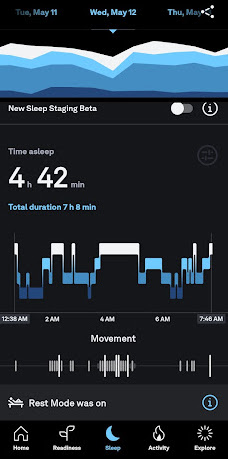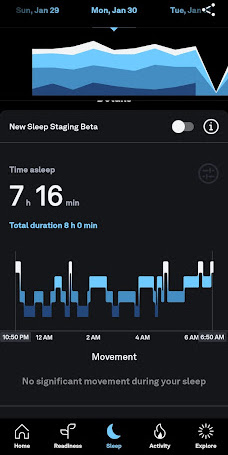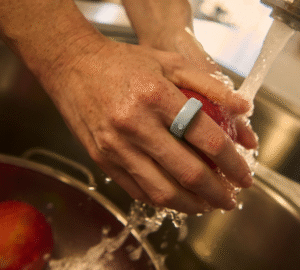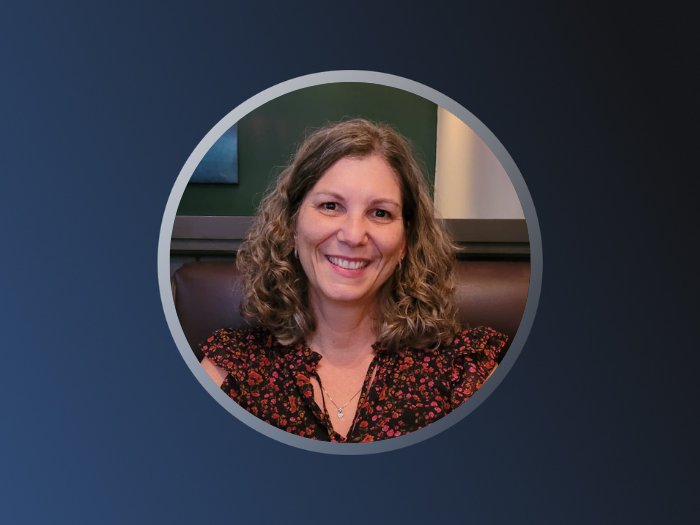Who: Lisa D., 53, leadership facilitator and coach in Kitchener, ON, Canada
Surprising Oura insight: When Lisa’s stress gets hard to manage, her sleep suffers. In recent years, she started having frequent panic attacks at night and worried she wasn’t getting enough quality sleep. That’s when her naturopathic doctor recommended Oura to help her track and better understand her sleep habits.

Tell us about your sleep journey with Oura.
Getting good sleep has always been a big focus for me because I’ve dealt with sleep disorders and night terrors my whole life. I’ve learned that if I manage my stress, I can manage my sleep disorders. However, in recent years, new factors surfaced.
Part of my challenge was the menopause transition and the hormonal changes that go along with it. I also became my mother’s caregiver when she was diagnosed with Alzheimer’s. And then, the pandemic. I had a lot going on at once, which is when I started to have panic attacks at night — in part because I became obsessed with the need for sleep. I know how important it is for your overall health and especially for preventing cognitive decline.
I’d have panic attacks when I’d believe I wasn’t getting enough sleep. It got so bad for a while that I was having about three panic attacks a week. My husband even teases and calls me Fiona, like from Shrek: princess by day, ogre by night!
How did you go about addressing your sleep anxiety?
First, I tried cognitive behavioral therapy and Rapid Transformational Therapy. These approaches were somewhat helpful, but I was still having panic attacks. That’s when I started working with a naturopathic doctor, who introduced me to Oura. She wondered if I was actually getting more sleep than I realized and suggested Oura to help me understand how much rest I was getting.
With Oura, I’d wake up in the morning thinking it had taken me forever to fall asleep, but I’d look at my data and realize that wasn’t the case.
How many hours of sleep were you getting on the nights you thought you weren’t sleeping?
I was getting about five or six hours of sleep. For me, I feel best with at least seven hours of sleep — so, to get seven hours, I have to be in bed for nine hours. I still get up a couple times at night, but now I’m sleeping three to four hours straight without interruption, which is huge for me.
What changes have you noticed since tracking your sleep with Oura?

My deep sleep is better and I started dreaming again. I realized I wasn’t getting good REM sleep before. Now, I understand how everything works together. If I feel achy, I know I didn’t get a very good night of deep sleep. If I feel foggy, I know I didn’t get good REM sleep. I’m thankfully in a place where my sleep keeps getting better and better. I’ll go weeks before I have any kind of an episode. It’s not perfect, but now I have the tools to deal with it.
What else has Oura helped you with?
I learned about my resting heart rate and HRV for the first time with Oura. I would wake up with brain fog and think it was related to menopause. But once I started examining my overnight resting heart rate graph in Oura, I realized I didn’t get brain fog the nights I have the ideal heart rate curve (the “hammock”). So then, I really started paying attention: I made my dinner earlier, and my workouts in the afternoon, and I stopped drinking alcohol and coffee.
My HRV doubled from an average of around 15 to an average of over 30. My max is getting up around 70 now. For me, that’s really good.
What advice would you give to other Oura members?
I’d urge them to monitor their trends over time in order to make real changes and improvements. Also, I think everyone should understand their resting heart rate (RHR) and their heart rate variability (HRV).
RELATED: All About Your Resting Heart Rate
What’s Your Oura Story?
Everyone’s story is unique, and we’d love to hear yours. Share your story here.











